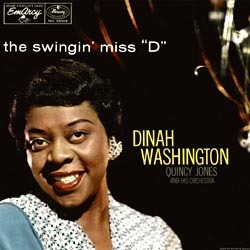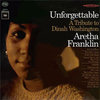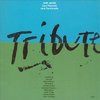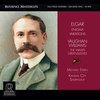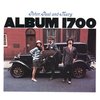AAA 100% Analogue This LP was Remastered using Pure Analogue Components Only from the Master Tapes through to the Cutting Head
Speakers Corner / Mercury - MG 36104 - 180 Gram Virgin Vinyl -
AAA 100% Analogue - Audiophile Mastering
Limited Edition - Pressed at Pallas Germany
Speakers Corner 30 Years Pure Analogue This LP is an Entirely Analogue Production
There’s great transparency and a tinge of boxiness but instrumental timbres are, for the most part, believable, especially the horns Washington’s biggest “pop” breakthrough was the moody “What a Difference a Day Makes,” which cut through 1959’s rock clutter to reach #8 on the pop charts. Washington died of an accidental overdose of prescription pills but thanks to swell reissues like this, she lives on to seduce and thrill future generations of music lovers. but the original is an exquisite set piece and reminder of a time now long gone, when elegant and sophisticated music was in the mainstream. - Michael Fremer Sound 8/10
One certainly couldn’t say that Ruth Jones had a velvety, smoochy voice! But in jazz history that’s never been of prime importance. Dinah Washington, the name she used at her debut in 1942, became the 'Queen' of rhythm ’n’ blues, but was also an excellent big-band singer under bandleaders Lionel Hampton and Quincy Jones.
She asked the latter (as well as Benny Golson and Ernie Wilkins) to write arrangements for her in December 1956, and 'borrowed' his band for eleven classic numbers. In the ensemble were such top-notch soloists as Clark Terry, Quentin Jackson, Anthony Ortega, Lucky Thompson – and the band swings along right from the very first to last note. That the 'Queen' is capable of immense expression in ballads, and even in a cappella introductions, is amply demonstrated in "I’ll Close My Eyes". She improvises her way through this gem, filling it with emotion, and not in the least schmaltzy, and follows it up with "Somebody Loves Me" – no wonder the album earned the name "The Swingin’ Miss D”.
Dinah Washington was accompanied by an orchestra organized and conducted by Quincy Jones on this 1957 album, and she was singing to arrangements mostly written by the young bandleader, swing charts of pop standards by the likes of Cole Porter, George Gershwin, and Duke Ellington. The result had much in common with the swing albums of Frank Sinatra in the same period, especially because Jones' arrangements were heavily influenced by Billy May and Nelson Riddle. Sinatra's records were regarded as "pop, " of course, and Washington's, at least when released on the EmArcy subsidiary of Mercury Records, as "jazz, " but her precise articulation and attention to lyrical meaning left little room for improvisation, and while Jones allowed for brief solos from a band that included Charlie Shavers, Clark Terry, Urbie Green, and Milt Hinton, the jazz categorization was actually arbitrary. Whatever musical genre you assign it to, however, this is an excellent Washington album.
Luckily record companies recognised the talent of this lady from Alabama and her gigantic sales figures have proved them right.
This EmArcy LP is one of the 'Queen’s' best and even 50 years after its first release the quality is still totally satisfying.
Dinah Washington was accompanied by an orchestra organized and conducted by Quincy Jones on this 1957 album, and she was singing to arrangements mostly written by the young bandleader, swing charts of pop standards by the likes of Cole Porter, George Gershwin, and Duke Ellington. The result had much in common with the swing albums of Frank Sinatra in the same period, especially because Jones' arrangements were heavily influenced by Billy May and Nelson Riddle. Sinatra's records were regarded as "pop, " of course, and Washington's, at least when released on the EmArcy subsidiary of Mercury Records, as "jazz, " but her precise articulation and attention to lyrical meaning left little room for improvisation, and while Jones allowed for brief solos from a band that included Charlie Shavers, Clark Terry, Urbie Green, and Milt Hinton, the jazz categorization was actually arbitrary.
Whatever musical genre you assign it to, however, this is an excellent Washington album
Dec 1956 in New York City
Musicians:
Dinah Washington, vocals
Quincy Jones and his Orchestra
Selections:
1. They Didn't Believe Me
2. You're Crying
3. Makin' Whoopee
4. Ev'ry Time We Say Goodbye
5. But Not For Me
6. Caravan
7. Perdido
8. Never Let Me Go
9. Is You Is Or Is You Ain't Ma Baby?
10. I'll Close My Eyes
11. Somebody Loves Me
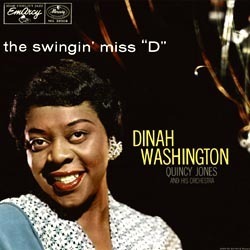
20 Years pure Analogue
Are your records completely analogue?
Yes! This we guarantee!
As a matter of principle, only analogue masters are used, and the necessary cutting delay is also analogue. All our cutting engineers use only Neumann cutting consoles, and these too are analogue. The only exception is where a recording has been made – either partly or entirely – using digital technology, but we do not have such items in our catalogue at the present time
Are your records cut from the original masters?
In our re-releases it is our aim to faithfully reproduce the original intentions of the musicians and recording engineers which, however, could not be realised at the time due to technical limitations. Faithfulness to the original is our top priority, not the interpretation of the original: there is no such thing as a “Speakers Corner Sound”. Naturally, the best results are obtained when the original master is used. Therefore we always try to locate these and use them for cutting. Should this not be possible, – because the original tape is defective or has disappeared, for example – we do accept a first-generation copy. But this remains an absolute exception for us.
Who cuts the records?
In order to obtain the most faithful reproduction of the original, we have the lacquers cut on the spot, by engineers who, on the whole, have been dealing with such tapes for many years. Some are even cut by the very same engineer who cut the original lacquers of the first release. Over the years the following engineers have been and still are working for us: Tony Hawkins, Willem Makkee, Kevin Gray, Maarten de Boer, Scott Hull, and Ray Staff, to name but a few.
At the beginning of the ‘90s, in the early days of audiophile vinyl re-releases, the reissue policy was fairly straightforward. Companies such as DCC Compact Classics, Mobile Fidelity, Classic Records and others, including of course Speakers Corner, all maintained a mutual, unwritten code of ethics: we would manufacture records sourced only from analogue tapes.
Vinyl’s newfound popularity has led many other companies to jump on the bandwagon in the hope of securing a corner of the market. Very often they are not so ethical and use every imaginable source from which to master: CDs, LPs, digital files and even MP3s.
Even some who do use an analogue tape source employ a digital delay line, a misguided ’80s and ‘90s digital technology that replaces the analogue preview head originally used to “tell” the cutter head in advance what was about to happen musically, so it could adjust the groove “pitch” (the distance between the grooves) to make room for wide dynamic swings and large low frequency excursions. Over time analogue preview heads became more rare and thus expensive.
So while the low bit rate (less resolution than a 16 bit CD) digital delay line is less expensive and easier to use than an analogue “preview head”, its use, ironically, results in lacquers cut from the low bit rate digital signal instead of from the analogue source!
Speakers Corner wishes to make clear that it produces lacquers using only original master tapes and an entirely analogue cutting system. New metal stampers used to press records are produced from that lacquer. The only exceptions are when existing metal parts are superior to new ones that might be cut, which includes our release of “Elvis is Back”, which was cut by Stan Ricker or several titles from our Philips Classics series, where were cut in the 1990s using original master tapes by Willem Makkee at the Emil Berliner Studios. In those cases we used only the original “mother” to produce new stampers.
In addition, we admit to having one digital recording in our catalogue: Alan Parsons’ “Eye in the Sky”, which was recorded digitally but mixed to analogue tape that we used to cut lacquers.
In closing, we want to insure our loyal customers that, with but a few exceptions as noted, our releases are “AAA”— analogue tape, an all analogue cutting system, and newly cut lacquers.
PALLAS
Audiophile Vinyl - Made in Germany For over 60 years the family business in the third generation of the special personal service and quality "Made by Pallas" is known worldwide. Our custom PVC formulation produces consistently high pressing quality with the lowest surface noise in the industry. Our PVC complies with 2015 European environmental standards and does not contain toxic materials such as Lead, Cadmium or Toluene. Our vinyl is both audiophile and eco-grade!
